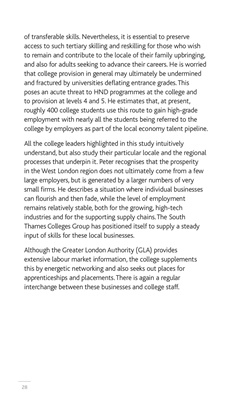
28
of transferable skills. Nevertheless, it is essential to preserve
access to such tertiary skilling and reskilling for those who wish
to remain and contribute to the locale of their family upbringing,
and also for adults seeking to advance their careers. He is worried
that college provision in general may ultimately be undermined
and fractured by universities deflating entrance grades. This
poses an acute threat to HND programmes at the college and
to provision at levels 4 and 5. He estimates that, at present,
roughly 400 college students use this route to gain high-grade
employment with nearly all the students being referred to the
college by employers as part of the local economy talent pipeline.
All the college leaders highlighted in this study intuitively
understand, but also study their particular locale and the regional
processes that underpin it. Peter recognises that the prosperity
in the West London region does not ultimately come from a few
large employers, but is generated by a larger numbers of very
small firms. He describes a situation where individual businesses
can flourish and then fade, while the level of employment
remains relatively stable, both for the growing, high-tech
industries and for the supporting supply chains. The South
Thames Colleges Group has positioned itself to supply a steady
input of skills for these local businesses.
Although the Greater London Authority (GLA) provides
extensive labour market information, the college supplements
this by energetic networking and also seeks out places for
apprenticeships and placements. There is again a regular
interchange between these businesses and college staff.